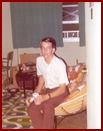
Aaron Sissom in barracks at Naha

Aaron Sissom in barracks at Naha
I have to say that YNSA Sissom was a very good sport. We didn't give him the best of welcome's on his first week. In fact the crew took one or two cruel advantages. I think it may have been MN1 Bombard, or just possibly Chief Muessig who orchestrated the jest. Sissom, of course, being a yeoman had no training in explosives. But ignorance is by no means bliss in a place where folks who have never set foot there aid in exagerating its dangers.
Ordinance workers, when it suits them, will play the dangers up a good deal...to strangers. But amongst ourselves it was like working at a bank. To bank tellers money soon becomes just a bunch of green stuff to count and put away. High explosives in big green cans were much the same to us. But to a yeoman fresh out of A-School, it was something novel indeed.
I was sent to go and fetch Sissom from the plane, get his stuff dropped off at the barracks, and usher him forthwith to the mine shop. His first impression was that the Navy had put the mine shop well away from all the more valuable real estate. In fact they had put it on an island at the end of a mile-long causeway. More than this it was on the far side facing the sea. It looked every bit as secure as a fortress. There were three fences, one of these distinct from the others for its concrete pillars and being stood off on big, heavy glass insulators: obviously of the electric persuasion. Formerly, that same island had been also used to store some nukes. But that had been a few years ago, and now the electric fence was turned off. I believe I neglected to share with Aaron this last information.
Rounding the island he spies the shop. The first thing anyone notices are all of all the wires and pointy things mounted on poles all around. To his inquiry I explain that we were told these are supposed to protect us from lightning strikes...what with all the bombs and things we have laying around. "You get lightning here at the mine shop?", he asked. "Almost never," I replied. "Has a mine shop ever blown up?" he inquired. "Only ever once that I know of," I bounced back. I did not tell him that it was during World War Two.
Then when Sissom had arrived on station, and had been introduced all around, and had all of his paperwork handled, had been interviewed both by the Chief and by Lt. Dunn, he was given over to the mercies of the rest of the crew. Important it was to inoculate him with some dire warnings. Firstly he was not allowed to enter the mine shop working bay, not until his special non-sparking shoes would arrive. This was in fact a real precaution, but the drama was over-ample to say the least. And there were a few more tidbits like that.
Then one day, after his special shoes had arrived, Lt. Paul Dunn sent him out into the mine assembly bay with a message to be handed personally to MN1 Bombard (if I have the name correctly after all these years). Now if there is one tool an uninformed person does not expect to see arrayed among the implements of an mine assembly technician, it is a hammer. But indeed we did have hammers, big ones too. Mostly these were of the leather or rubber persuasion, a characteristic not readily identified while in motion. MN1 Bombard had made sure that everybody had such a hammer ready to hand for when Sissom should make his appearance.
Then came Sissom, through the door with the big red sign, into a room containing twenty two-thousand-pound cans of high explosive arrayed ten to a side. His first time. He is impressed. In fact it is kind of cool. There is a moment of hushed silence. Then at a nod all the minemen in the room start pounding on those cans with hammers. Sissom dropped his note with a gasp and fled post haste back whence he came.
That was the worst, but certainly not the last of it. I too am guilty. It was my job to escort him on his rounds of the base, to pick up messages, show him where things are and the like. I took him to the command center, which required crossing the flight line in a truck, lecturing on the danger of being run down by starfighter jets coming in for a landing...just as had been done to me. This too was a real danger, but only to those who pay no attention whatsoever. But for my part the worst thing I think was that I made him to carry messages out from the radio shack to the truck and hold them face down...so that Russian satellites would hopefully not be able to read them. I don't know how long he kept doing that.
Update: I have recently heard from Aaron. We had a very nice chat on the phone. He retired as a YNC after 20 years, earned a pair of college degrees, and now keeps himself amused with a second career...as VP of a firm in Nashville. He has promised to recount a story or to for this series, maybe even dig up some pictures.